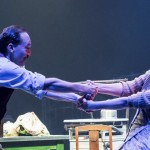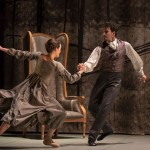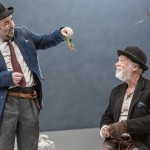Brian Friel’s Translations at Sheffield Crucible theatre
With its evocative set, fine cast and well-measured humour, this production of Translations, written in 1980 by Ireland’s foremost living playwright Brian Friel, is a delight.
A blackbird sings and an Irish fiddle plays; blue skies fill the space beyond a stone barn with wicker baskets, wooden stairway, buckets and clutter, and straw and gravel strewn about the yard. Later, as thunder rumbles, events take a darker turn and the colour drains from the sky. We’re in Baile Beag (Small Town) in rural Donegal, 1833, eight years before the great potato famine. British Redcoats arrive to create an Ordnance Survey map of Ireland, on which they’ll replace Irish place names with English ones, even though these lack both the depth of meaning and the sheer beauty of the original names. Their translator is Owen, son of local schoolmaster, Hugh, returning after six years away.
Loss of traditional culture, the need for progress, the rise of colonialist domination and conflict are all elements in this piece, but centre stage, banging no particular political drum, sits the role of language in human life with its messy, complicated job of communication. While it’s true that language may clarify and pacify, it can just as often confuse, deceive and create a chaos of misinterpretation, distrust and hatred. It can bring a sense of identity and belonging or take it away, cement relationships or destroy them.
Friel’s fascination for language and his love of the music of human speech in all its diverse and delightful forms comes over loud and clear in this wordy play, not just in English but in Latin, Greek and Gaelic (- though for the sake of the audience, the Irish of Baile Baeg speak English onstage.) He’s sometimes dubbed the Emerald Chekhov for the way he creates humour out of stress and sorrow whilst using the personal dramas and relationships of a few characters, with their carefully chosen, powerful words, to reflect how events have impact not just on individuals but on an entire society or nation.
The balance of humour and sad truths is handled magnificently. As schoolmaster Hugh spouts hefty chunks of wondrous Latin verbatim et ad infinitum, Niall Buggy does a wonderful job of lacing his erudite eloquence with the right measure of inebriated sway, creating great warmth and credibility as well as humour.
Northcote is superb as the romantic British soldier, Yolland, filled head to toe with fresh innocence, tenderness and vibrant enthusiasm as, ironically, he falls head over heels in love with glorious Ireland and its dreamy language just as it is now – and finally, too, with earnest, ambitious Maire, played beautifully by Beth Cook. Having no common language to speak together, the powerful language of emotion takes over from mime, giving rise, as ever, to both understandings and misunderstandings.
Quietly and subtly, Roxanna Nic Liam also demonstrates the possibilities and the limitations of communication without language, as Sarah, a girl who can scarcely utter any word at all. John Conroy is a likeable Jimmy Jack, the improbably learned eccentric in tramp’s garb, while Ciaran O’Brien’s caring, limping Manus, Owen’s brother, becomes more and more a ball of injured, frustrated anguish as events progress.
There’s food for thought a-plenty in the words and ideas that come thick and fast throughout, conjuring up contemporary parallels, while, through the joy of language itself, through suspense created by a well crafted narrative with evolving relationships both tender and torn, through delicate characterisations both sad and funny, through the joyous clash of drinkers’ potcheen cups and a full tilt Irish dance, we are kept royally entertained all round. Beautifully done.
Eileen Caiger Gray
Translations is currently part of Sheffield’s 3-play mini-fest and will tour nationally until May.




